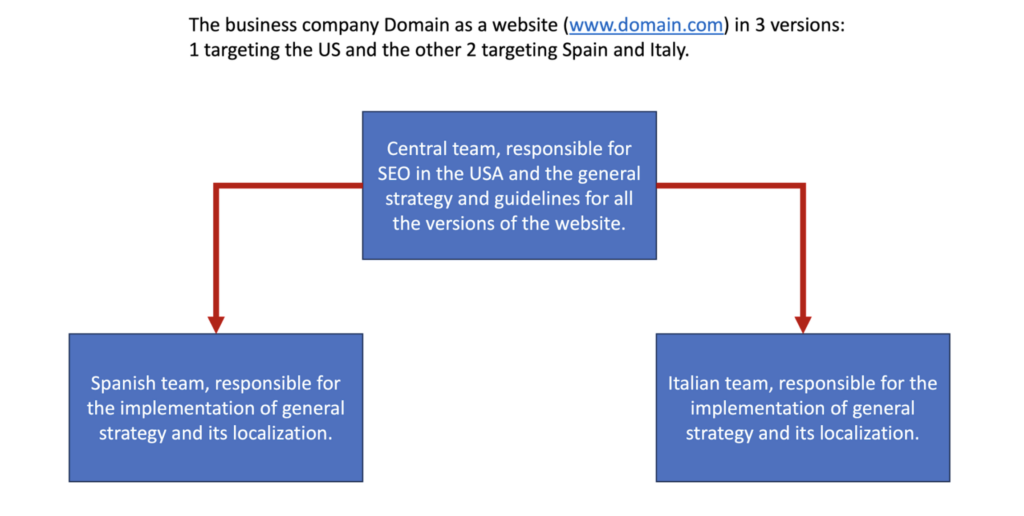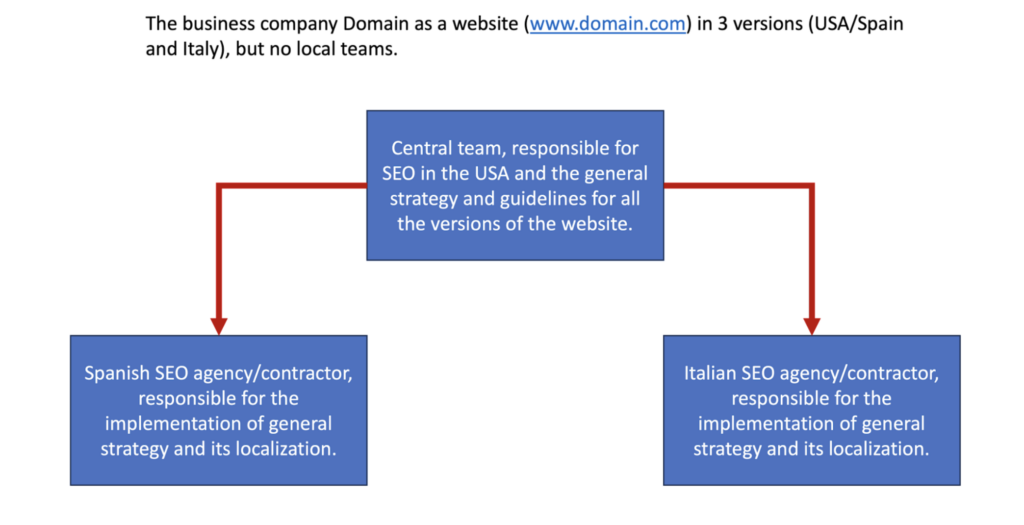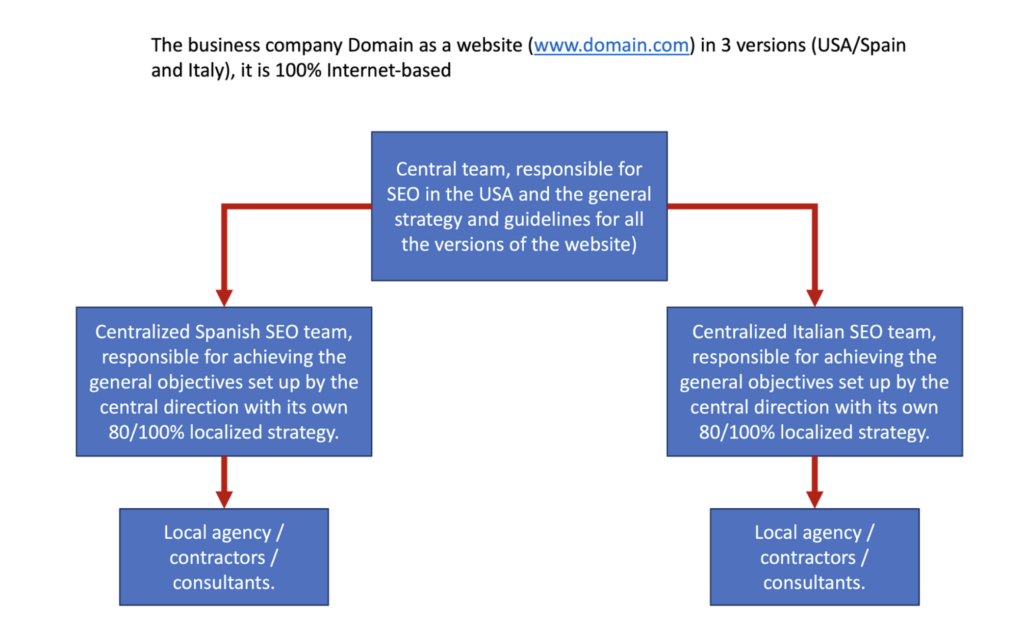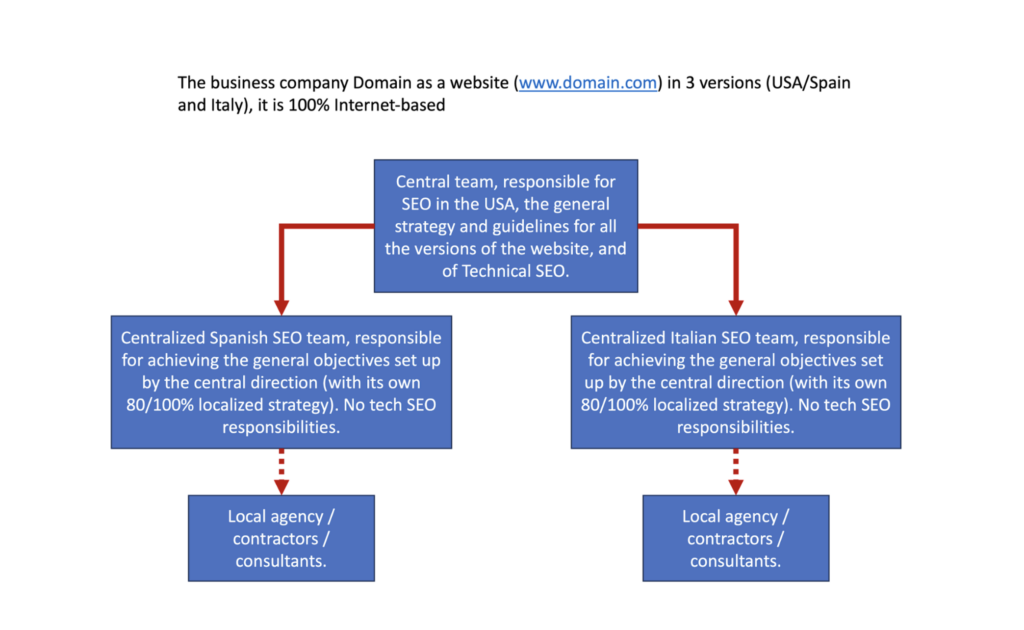In the ever-evolving digital marketing landscape, the importance of a well-crafted international SEO strategy, which is all about localization, cannot be overstated. With businesses expanding their reach globally, the need for an effective approach to cater to diverse markets becomes crucial.
One innovative and adaptive method gaining traction is a decentralized marketing strategy. In this article, we’ll look at the key differences between a centralized versus decentralized strategy and also discuss its benefits.
What exactly is a decentralized marketing strategy?
A decentralized marketing strategy for international SEO involves empowering regional or localized teams and individuals with the autonomy to tailor SEO efforts based on local nuances, preferences, and search behaviors.
This approach acknowledges the diversity in language, culture, and search engine algorithms across different regions. Instead of implementing a one-size-fits-all strategy from a central location, decentralized marketing recognizes the need for localized optimization.
According to Aleyda Solis, SEO Consultant and Founder at Orainti:
“Decentralized marketing means you’ll be able to leverage the native language skills of the team and facilitate how well the team understands the local audience’s needs. As such, they can better localize the content and improve overall web presence and activities.”
Key components of a decentralized marketing strategy
While strategies may differ across business and specifically for certain countries, there are a number of components in a decentralized marketing strategy that remain consistent. These include:
Localized keyword research
Understanding the specific keywords used by the target audience in different regions is crucial. Decentralized teams can conduct thorough keyword research to identify terms relevant to their local market, ensuring content is aligned with regional search patterns.
Cultural sensitivity
Different cultures uniquely respond to content. A decentralized approach allows for the creation of culturally sensitive content, addressing specific preferences and societal norms in each target region.
Regional backlinking
Building high-quality backlinks is essential for SEO, and a decentralized strategy allows teams to focus on acquiring backlinks from authoritative sources within their region. This improves the website’s credibility and relevance in local search results.
Adaptation to local algorithms
Search engines often have region-specific algorithms. A decentralized approach enables teams to stay updated and adapt to algorithm changes in their respective regions, ensuring optimal search engine visibility.
[Ebook] International SEO: Part 1
Why is decentralized marketing so important?
Thinking strategically and creating a detailed international SEO strategy before implementing it is the best way to ensure success. One fundamental step is to make sure that all teams are on board in regards to your priorities and why you’ve chosen to implement a decentralized strategy in the first place.
Many companies chose a decentralized strategy because they believe the following points to be non-negligible.
Cultural relevance: Consumers are more likely to engage with content that resonates with their culture. A decentralized strategy ensures that marketing efforts are culturally relevant, leading to increased trust and resonance with the target audience.
Language precision: Language intricacies vary across regions. A decentralized approach allows for precise language usage, avoiding translation errors and ensuring that content is compelling and authentic.
Agility and responsiveness: Local teams can respond quickly to market changes, emerging trends, and competitive landscapes. This agility is a significant advantage in the fast-paced world of digital marketing.
Improved ROI: By tailoring SEO efforts to each region’s unique needs, a decentralized strategy can result in improved return on investment (ROI). Customized campaigns are more likely to drive relevant traffic and conversions.
Veronika Höller, Global SEO Lead said,
“To successfully execute a decentralized marketing strategy in international SEO, think of it as cultivating a global garden. Each region is a different plant, requiring unique care—understand the local soil (culture), provide the right nutrients (content), and adjust the sunlight (media strategy). When tended with respect and knowledge, your garden will flourish in every climate, beautifully diverse yet part of a cohesive landscape”
Centralized vs. decentralized marketing
As compared to the decentralized version, centralized marketing involves managing marketing strategies, decisions, and implementation from a central location or headquarters. The key decisions regarding campaigns, content, and overall strategy are made by a centralized team, often with little or no direct input from local teams in various regions. Below is a quick overview of its advantages and disadvantages.
Centralized Marketing
| Advantages | Disadvantages |
|---|---|
| Consistency: Ensures a consistent brand message and image across all regions, promoting a unified global identity. | Lack of local relevance: May overlook local nuances, leading to content and campaigns that are less relevant to specific regional audiences. |
| Cost-efficiency: May result in cost savings due to streamlined processes, bulk purchasing, and centralized resource management. | Limited adaptability: It may be challenging to adapt quickly to regional changes or capitalize on local opportunities, as decision-making is concentrated at a central level. |
| Control: Centralized control allows for standardized practices and easier monitoring of key performance indicators (KPIs) from a central perspective. | Language and cultural challenges: The central team may struggle with understanding and incorporating diverse languages and cultural sensitivities, potentially leading to communication gaps. |
The benefits of decentralized marketing for international SEO
Decentralized marketing in international SEO brings valuable advantages for businesses in diverse global markets. Scalability and cost-effectiveness are evident as localized efforts optimize resources.
Moreover, the decentralized model promotes collaborations among diverse teams, fostering cross-cultural insights and knowledge sharing. This synergy unlocks growth opportunities by tapping into emerging markets and capitalizing on local trends, driving international expansion.
We touched on a couple important elements regarding decentralized marketing earlier on, now let’s examine its benefits in detail.
Increased efficiency and localization
Decentralized marketing helps regional teams be more efficient by allowing them to focus on their specific markets. With a deep understanding of local cultures, languages, and consumer behaviors, these teams can craft targeted and highly relevant marketing strategies.
This localization not only enhances the efficiency of campaigns but also ensures that content truly speaks to its intended audiences, driving engagement and improving search engine visibility in specific regions.
Faster decision-making and enhanced creativity
With more autonomy to respond swiftly to changing market dynamics and emerging trends, local teams can tap into relevant insights to create content that fits the context and is also innovative.
The ability to make quick decisions and infuse creativity into campaigns positions businesses to stay ahead of the competition and also react to quickly changing market trends.
Better customer engagement
A decentralized approach to international SEO allows for better customer engagement by tailoring content to the preferences and expectations of local audiences. Regional teams, intimately acquainted with their markets, can create content that establishes a genuine connection with customers, fostering trust and loyalty.
Scalability and cost-effectiveness
Scalability and cost-effectiveness are easier to optimize with a decentralized structure. Local teams can focus on the most impactful strategies for their regions, avoiding unnecessary expenses associated with a one-size-fits-all centralized approach. This targeted resource allocation not only maximizes the efficiency of campaigns, but also enables businesses to scale their international SEO efforts without incurring significant additional costs.
More growth opportunities
The decentralized model opens up more growth opportunities by allowing local teams to adapt strategies based on regional insights. As such, companies can tap into emerging markets, capitalize on local trends, and identify new customer segments. This flexibility and responsiveness to regional opportunities can help businesses expand their reach and capitalize on untapped markets, promoting sustained growth.
The challenges of decentralized marketing
With any choice, in business or in life, comes pros and cons. Although decentralized marketing can be great for the number of reasons listed above, it can also have its disadvantages. As you develop your international strategy, it’s important to examine all the evidence and make an informed decision about what makes the most sense for your business.
Siloed organizational structures
One significant challenge of decentralized marketing is the risk of siloed organizational structures. When decision-making and responsibilities are distributed across different regional teams, there’s a potential for isolated efforts that lack cohesive coordination.
Silos can hinder the sharing of valuable insights and strategies, leading to duplicated efforts, inconsistencies, and a fragmented approach to global SEO initiatives.
[Ebook] International SEO: Part 2
Communication barriers
Decentralization can also introduce communication challenges, particularly when teams are dispersed across various regions. Differences in time zones, languages, and communication styles can create barriers that impede the smooth exchange of information.
Effective communication becomes crucial for maintaining a cohesive international SEO strategy, and overcoming these barriers requires concerted efforts to establish clear channels, tools, and protocols for cross-regional communication.
Lack of coordination and control
Another challenge involves the potential lack of coordination and control in a decentralized marketing setup. While autonomy empowers regional teams, it may also lead to disparities in how, when and why any part of an SEO strategy should be executed.
Centralized control can be compromised, making it challenging to enforce uniform standards, monitor key performance indicators (KPIs), and ensure that the overarching goals of the international SEO strategy are met. Striking the right balance between autonomy and centralized oversight becomes essential to overcome this challenge.
Managing and executing a successful strategy
As explained above, managing a successful international SEO strategy comes with its challenges. It therefore necessitates a strategic approach that balances regional autonomy with centralized coordination.
In this context, implementing key management tips becomes imperative to harness the benefits of decentralized marketing and drive successful SEO initiatives.
Determine what kind of business you’re working with
When I asked Gianluca Fiorelli, International and Strategic SEO Consultant, to share some of his own personal tips, he was very generous to provide examples of four models for decentralized international SEO. Before you get started, it’s necessary to determine what type of business you are dealing with. Ask yourself:
- Does the company’s website have versions targeting different countries?
- Is the company 100% internet-based or does it also have a physical presence in the targeted countries?
- Are there local teams in the targeted countries?
- Is the company a multinational with physical presence in the targeted territories?
If a company’s website has versions targeting different countries, then each local version should be held by a local team established in that country. It should look like this:

In the case of businesses that do not have a local team in the targeted countries, then decentralization can be possible, but by delegating the execution of the general strategy and its localization to local agencies or contractors:

Then, we can have a multinational company with physical presence in the targeted territories, hence also with a local team for SEO and digital marketing in general.
In such a case, (think of McDonalds, for instance), it is very common that the local branch of the multinational company – while having obvious and very generic objectives of growth established by the global direction-has almost total freedom to establish its own marketing, communication and SEO strategy.

Another possible model can be used by both companies with a physical presence in the international markets they target and internet-based companies.
In this case, everything related to the maintenance of the website is the responsibility of a unique team, which can be centralized or, in some fewer cases, decentralized in a country (i.e. India). On the other hand, the localization aspect of the international versions is the responsibility of local teams, which may or may not delegate it fully or partly to local agencies/contractors.

“If our role is that of an international SEO consultant or SEO in an agency, it is important to understand from the beginning which of these models presented above is the one that is in force in the case of our client.
Knowing this, it will be easier for us to understand who really makes decisions, of what type, in what context and, therefore, to which people we need to have access.
For example, in the fourth case (centralized technical SEO and localized content localization), even if we work closely with the local team, we will still have the freedom to access, discuss and make recommendations to the central team.”
Gianluca Fiorelli, International and Strategic SEO Consultant
Tips for executing your strategy
Selecting the appropriate approach for managing and executing international SEO is paramount for businesses seeking global success. The choice between centralized and decentralized approaches involves striking a delicate balance, as the wrong approach can lead to inconsistencies, inefficiencies, and missed opportunities.
The right approach, implemented correctly, fosters a deeper connection with diverse audiences, improves search engine visibility, and positions the brand as a relevant and trustworthy entity on a global scale.
Implement a centralized hybrid model
Establishing a centralized hybrid model can strike a balance between autonomy and coordination. This approach allows regional teams to customize strategies based on local insights while maintaining centralized oversight for consistency and alignment with overarching goals.
But remember to maintain centralized oversight and coordination to ensure that regional efforts align with the overall marketing strategy. Regular coordination meetings and reporting structures help maintain a unified approach while respecting regional differences.
Provide standardized marketing resources and set guidelines
Ensuring standardized marketing resources across regions promotes consistency and a unified brand identity. Templates, style guides, and approved content libraries can serve as valuable resources for regional teams, maintaining a cohesive global image.
Additionally, you should establish standardized guidelines to provide clear direction for regional teams. These guidelines should encompass SEO best practices, branding standards, and overarching strategic objectives to ensure alignment across diverse markets.
Leverage tools for effective collaboration and communication
Utilize digital collaboration tools, regular meetings, and streamlined communication channels to foster a cohesive team environment and facilitate the exchange of insights.
Marketing automation, project management, and analytics tools can enhance efficiency and provide valuable insights for informed decision-making.
Prioritize markets with issues
Identify and prioritize markets facing specific challenges or opportunities. Allocating resources strategically based on regional needs helps address issues efficiently, optimizing the impact of marketing efforts in critical areas.
Monitor and measure performance
Implement robust monitoring and measurement mechanisms to track the performance of SEO strategies in each region. Regularly analyze key performance indicators (KPIs) to identify successes, challenges, and areas for improvement. Use the insights gained to make data-driven adjustments to strategies, optimizing campaigns for maximum impact and staying adaptable to evolving market dynamics.
Provide ongoing training and support
Offer ongoing training and support to regional teams, keeping them updated on the latest SEO trends, tools, and company-wide strategies. This empowers teams with the knowledge needed to execute effective campaigns in their respective regions.
Empower regional autonomy with accountability
Empower regional teams with autonomy in decision-making while establishing clear accountability measures. This encourages creativity and responsiveness while ensuring that teams remain aligned with organizational goals and standards.
Adapt to regional needs responsively
Stay responsive to regional needs by adapting strategies based on local market conditions, cultural shifts, and emerging trends. Flexibility is key to addressing unique challenges and opportunities in each market effectively.
Key takeaways
In conclusion, the right approach to managing and executing international SEO is pivotal for businesses aiming to thrive in a global context.
The choice between centralized and decentralized marketing in international SEO depends on the specific goals, resources, and characteristics of the business. Striking the right balance or adopting a hybrid approach that combines the strengths of both strategies may be your optimal solution.
However, if you choose to implement a decentralized approach, be sure to do so with the strategic considerations and the appropriate tools. It can be a powerful way to navigate the complexities that come with global markets and international SEO.


